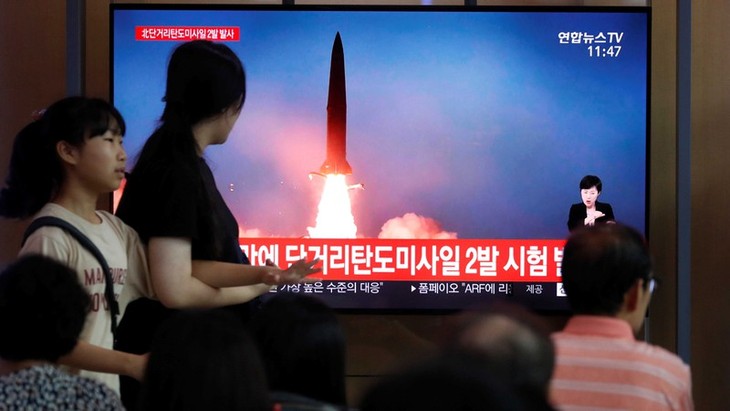(VOVWORLD) - Although there appeared hope for a peace deal following the first US-DPRK Summit in Singapore in 2018, the situation on the Korean peninsula remained up in the air. The 2nd US-DPRK Summit in Hanoi in February ended in deadlock and the DPRK repeatedly tested new weapons.
 People watch a screen that shows a file photo of a North Korean missile for a news report on North Korea firing short-range ballistic missiles, in Seoul, South Korea, July 31, 2019. (Photo: Reuters) People watch a screen that shows a file photo of a North Korean missile for a news report on North Korea firing short-range ballistic missiles, in Seoul, South Korea, July 31, 2019. (Photo: Reuters) |
The February 28 meeting in Hanoi between US President Donald Trump and DPRK Leader Kim Jong-un was abruptly cut short without a deal. At a midnight press conference that day, DPRK Foreign Minister Ri Yong-ho accused the US of causing the summit’s failure by not responding to Pyongyang’s proposals, and said Washington missed a good opportunity.
Just two months later, the DPRK conducted tests of two new weapons, paving the way for a dozen of weapons tests in the following months. The DPRK suspended inter-Korean contacts and projects and vehemently criticized Seoul for following Washington’s hostile policy. Korean peninsula tensions resumed.
New hope
Hope was ignited when Trump became the first sitting American president to set foot on DPRK soil at the truce village of Panmunjom on June 30. During the historic meeting, Trump invited Kim to visit Washington. The Panmunjom meeting had been arranged very swiftly during the US President’s visit to the Republic of Korea and showed both sides seemed eager to accelerate negotiations. Kim and Trump exchanged letters to cement their personal relationship.
But a high-level meeting in October in Sweden was unproductive. Pyongyang continued testing of ballistic missiles and an advanced launch system in the last two months of 2019, prompting President Trump to warn of a possible military response.
Denuclearization stances at odds
When nuclear talks were resumed in June 2018, the US and DPRK displayed different viewpoints on nuclear disarmament. Washington demands that Pyongyang implement substantial, verifiable, and irreversible denuclearization before any sanctions are eased or lifted. Pyongyang wants Washington and other parties to ease the sanctions concurrently with Pyongyang’s nuclear disarmament. Mutual trust has been insufficient to produce any significant progress.
Analysts say the US and DPRK are getting no closer to an agreement, even though both have expressed willingness to end confrontation and other parties like Russia, China, and the Republic of Korea have been supportive of the talks. The Korea Institute for Defense Analyses (KIDA) on Monday said the North might seek to develop Inter-continental Ballistic Missile (ICBM) designed to deliver warheads next year if nuclear talks fail.